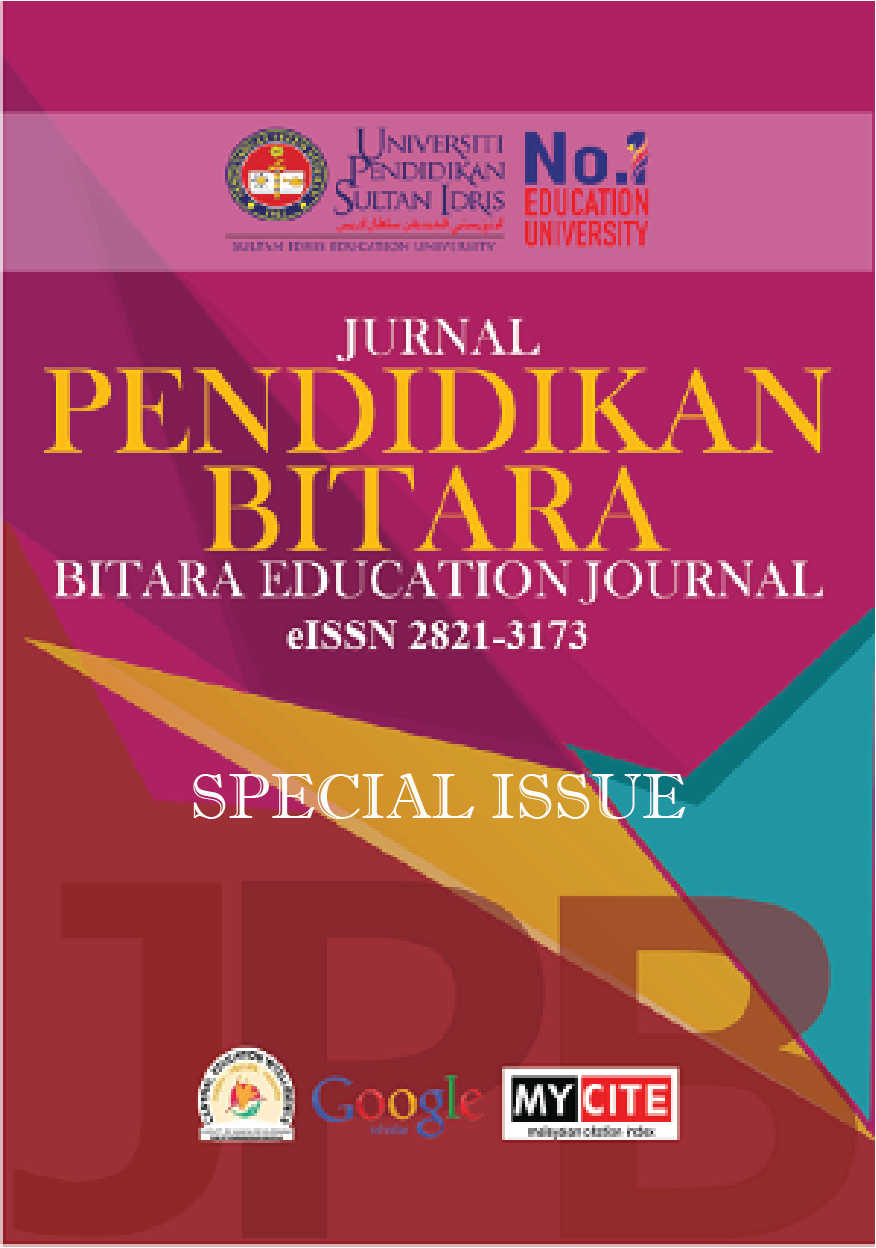Digital benefits among Early Childhood Education Lecturers (ECE) through New Pedagogies for Deep Learning (NPDL) through Teaching and Learning(TnL)
Pemanfaatan digital dalam kalangan Pensyarah Pendidikan Awal Kanak (PAKK) melalui Kapasiti Pedagogi Pembelajaran Bermakna (KPPB) dalam Pengajaran dan Pembelajaran (PdP)
DOI:
https://doi.org/10.37134/bitara.vol15.sp.3.2022Keywords:
New Pedagogies for Deep Learning, digital benefits, School Transformation, of Institute of Teacher Education Malaysia, Early Childhood EducationAbstract
The success of a transformation agenda is based on the support from all levels of the organization and commitment to change. Utilization of digital through Teaching and Learning (TnL) among Early Childhood Education (ECE) lecturers in terms of knowledge and skills are dependent on the implementation of meaningful learning in line with the framework of the New Pedagogies for Deep Learning (NPDL). This study of the Institute of Teacher Education Malaysia (ITEM) aims to identify the level of knowledge of ECE lecturers in implementing Deep Learning through the use of digital in TnL. This study uses a survey method with 100 ECE lecturers from 24 Campus of Institutes Teacher Education (ITE) as a sample of the study administered online. Meanwhile, the data collection process was implemented using a questionnaire instrument consisting of the dimensions of the School Transformation Concept (TS25) which is 15 items of pedagogical capacity, 8 items of digital utilization, and 6 items of global competence. The analysis of the study showed that only 37.0% of the lecturers had reached a high level. Meanwhile, 45.0% of the people were at the moderate level and 18.0% at the low level. This indicates the need for digital utilization knowledge among ECE lecturers that needs to be improved. Based on these findings, four dimensions and three levels of competencies have been produced which contain 50 types of NPDL Competency Profiles. Therefore, to ensure the level of knowledge and competence of ECE lecturers is high on the latest pedagogy, emphasis on the need for digital utilization among ECE lecturers through meaningful learning pedagogical capacity in teaching and learning should be given priority. This is to ensure that the Institute of Teacher Education (ITE) is a leading center of excellence for world-class teacher training in producing competent teachers.
Downloads
References
Amin Neghavati. (2017). Digital deep learning skills in teacher training programs: a Malaysian experience. Teaching and Learning with Technology. pp. 75-83.
Darina S., Paula L. & Conor S., (2021).‘It is no longer scary’: digital learning before and during the Covid-19 pandemic in Irish secondary schools. Technology, Pedagogy, and Education. 30:1, 159-181, DOI: 10.1080/1475939X.2020.1854844
Creswell, J.W. (2012). Educational research planning, conducting and evaluating quantitative and qualitative research. 4th ed. Boston: MA Pearson
Dong. L. (2020). Review of and suggestions for the global partnership project of new pedagogies for deep learning. Journal of Teacher Education. 7(3): 29-39. DOI: 10.13718/J.CNKI.JSJY.2020.03.005
Dubey. P & Pandey. D. (2020). Distance learning in higher education during a pandemic: challenges and opportunities. International Journal of Indian Psychology. 8(2): 43-46. DOI:18.01.204/20200802, DOI:10.25215/0802.204
Ellyza Karima. (2019). Reka bentuk pembelajaran dalam kapasiti pedagogi pembelajaran bermakna di IPG Kampus Pendidikan Teknik. Jurnal Refleksi Kepimpinan. Jilid I Oktober 2019. 144-159.
Ellyza Karima, Nor’Azah Ahmad Safran , Noor Haslinda Shuib, Haliza Hamzah , Norhayati Hashim & Mohd Paris Salleh. (2020). 6C Levels among trainee teachers upon the implementation of npdl in a teacher training institute. International Journal of Innovation, Creativity and Change. Volume 11, Issue 11.
Fraenkel, J.R., Wallen, N.E., Hyun H.H.(2012). How to design and evaluate research in education. 8th ed. New York: McGraw-Hill.
Fullan, M. & Langworthy, M. (2014) A rich. seam: How new pedagogies find deep learning, London: Pearson.
Fullan, M. (2011). The six secrets of change: What the best leaders do to help their organizations survive and thrive. San Francisco, CA: Jossey- Bass.
Fullan, M. (2019). Nuance: Why some leaders succeed and others fail. Thousand Oaks, CA: Corwin.
Fullan, M., & Quinn, J. (2016). Coherence: The right drivers in action for schools, districts, and systems. Thousand Oaks, CA: Corwin.
Fullan, M., McEachen, J., Quinn, J. (2016). New Pedagogies for Deep Learning. NPDL Global Report. (1st ed.). Ontario, Canada: Retrieved from http://npdl.global/wp-content/uploads/2016/12/npdl-global-report-2016.pdf
Fullan, M., Quinn, J. & McEachen, J. J. (2019). Deep Learning: Engage the World Change the World. Thousand Oaks, United States: SAGE Publications Inc.
Jacobs, H. H., & Alcock, M. H. (2017). Bold Moves for Schools: How We Create Remarkable Learning Environments. ASCD.
McTighe, J., & Sliver, H. F. (2020). Teaching for deeper learning: Tools to engage the student in Meaning-making. Alexandria, VA: ASCD
McEachen, J., Fullan, M., & Quinn, J. (2018). New Pedagogies for Deep Learning 2018 NPDL
Global Report. Ontario, Canada. Retrieved from: http://npdl.global/wp-content/uploads/2018/05/NPDL-Global-Report-2018.pdf
Mohd Rusdin, N., Ali, S. R., & Mahamad Zain, M. F. (2021). Usability Active Learning Pedagogy Based on 4K Skills for Even Number and Basic Operational Mathematics. Jurnal Pendidikan Bitara UPSI, 14(2), 65-77.
Nunall, J.C. (1978). Psychometric theory. New York: McGraw Hill.
Task Force Kapasiti Pedagogi Pembelajaran Bermakna IPGM .(2021). Kapasiti pedagogi pembelajaran bermakna: melangkau ekosistem pembelajaran dinamik. Cyberjaya. Institut Pendidikan Guru Malaysia





